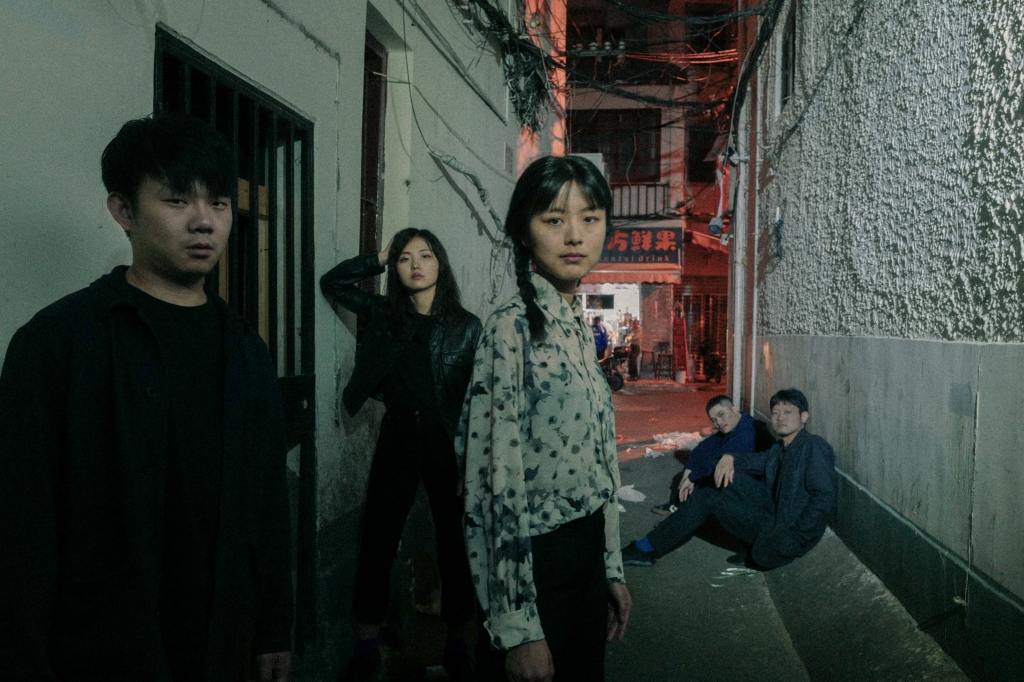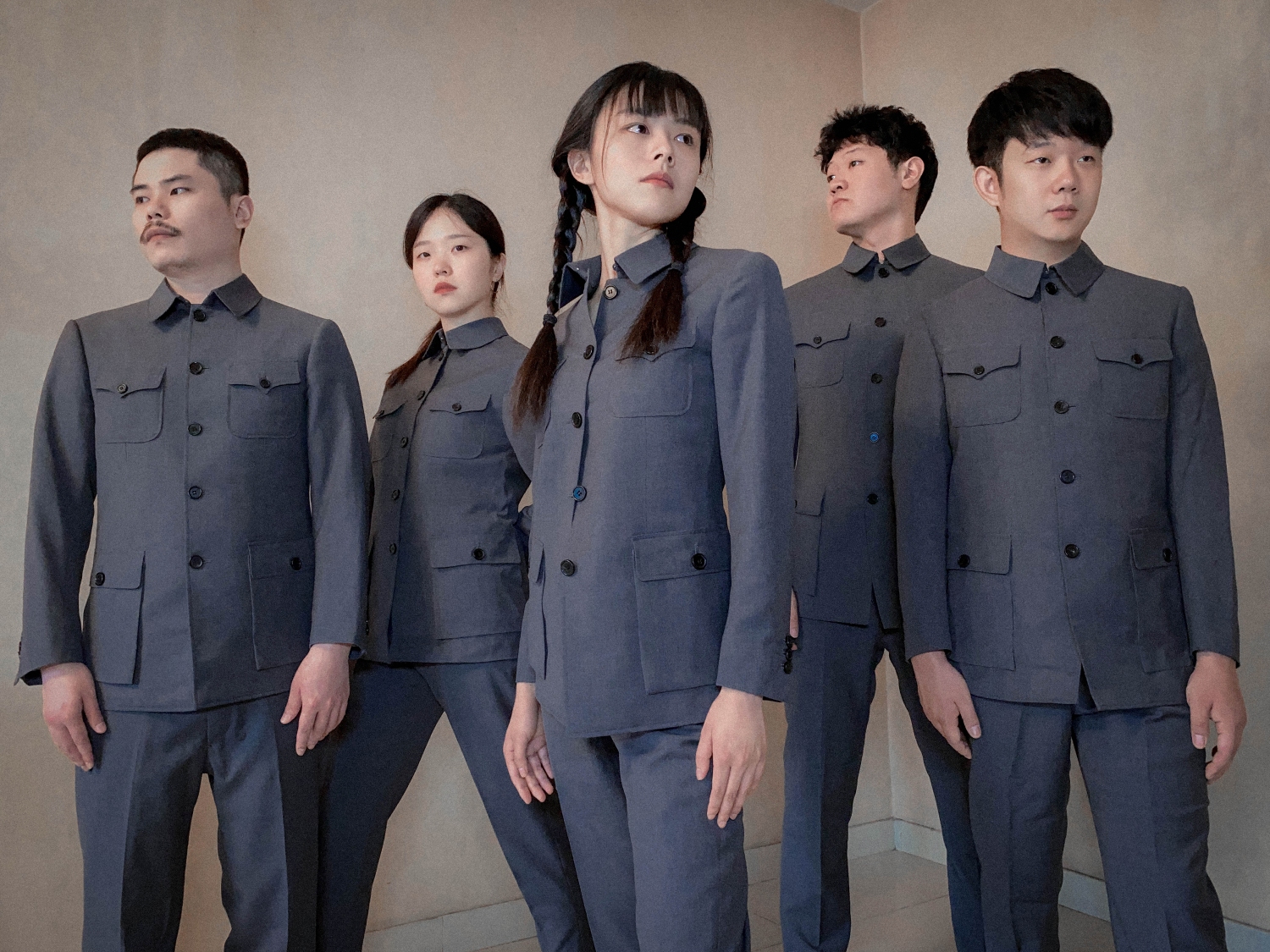On their third full-length album Bildungsroman, released last month via Beijing tastemakers Maybe Mars—Hiperson’s incisive, kinetic reconstructions of post-punk, art rock and noise manifest with bright, new sonic self-awareness.
“We want to discuss the urgency of now,” says Chen Sijiang, lead singer of Hiperson. We’re sitting in the courtyard of Yishan, a long-running retro antiques shop and bar attached to the back of Steam Hostel in Chengdu’s Wuhou District, a beloved local spot that reimagines objects of nostalgia with a fresh, modern twist. Packed with vintage TV sets, table lamps and telephones, with nooks and crannies full of cassettes, newspaper clippings and Mao-era daily artefacts, preservation and attention to detail is paramount—a fitting backdrop to discuss the band’s latest album Bildungsroman.
Living in the south-west city of Chengdu amidst a growing population of 15-million people, Hiperson essentially evolved in a state of hyper-acceleration. Indeed, the last time I interviewed the band was at the old Morning Bar on Democracy Road in 2015, a street that has since been razed and erased from the city map completely. In Chengdu, cicadas and concrete are the unflinching constants.
It’s been over five years since the release of their stellar debut No Need for Another History—the record that launched the band on a pivotal, get-in-the-van tour of China and Europe and cemented a devoted fanbase from Beijing to Berlin. Now, following years of performance, experimentation and self-produced records, including the lovely Dalston-tinged bedroom pop of Four Seasons EP released via London-based label Damnably last year, Hiperson have been connecting the dots for the story of Bildungsroman—a ten-track narrative opus that brings their sound of unwavering momentum into rich 20/20 focus.
Formed in early 2012, Hiperson’s story began at music and art school in Xindu (lit: New City)—a bizarre clash of skyscraper-meets-farmland sprawl north of the Sichuan capital, where cheap rent and lax rules gave students fertile ground to sow creative collaborations off-campus. “Xindu was a strange place back then,” says Chen, who moved to Xindu from the weapons-turned-infrastructure boomtown of Deyang, “we felt we were exploring something new together in a completely unknown environment.”
Original members Ji Yinan—an ambitious guitarist obsessed with 4AD’s back catalogue, Liu Zetong—a shy, military academy kid with a knack for hypnotic riffs and Chen Sijiang—an oil painting student with a peculiar reputation for drinking baijiu in class, first came together alongside a rhythm section of fellow classmates, later replaced by current drummer Wang Boqiang and bassist Wang Minghui a.k.a. Ming Ming, (formerly of electro-grrrl act The Hormones). Initially rendered as “Hi, person,” a sci-fi inspired greeting to the human race—the band quickly honed their dynamic sound of crisp, tightly packed guitars, percolating rhythms and gutsy, empowered Chinese lyrics—led by Chen’s rapid, staccato cries and Ji’s backing refrains.

Hiperson from left to right: Wang Boqiang, Wang Minghui, Chen Sijiang, Liu Zetong, Ji Yinan. Photography by Hiperson.
Unlike the NYC-inflected exclusivity of the Beijing experimental scene, Chengdu’s musical landscape was a delightful scramble—the band cutting their teeth everywhere from ganja dive bars mashed with punk, rap and psychedelia to late-night parties across the hedonistic club scene. “We didn’t necessarily fit in musically, it was more about the people,” says Ji, who grew up devouring the CDs his mother brought home from her archivist job at the local radio station, “everyone was playing together and working out how to do a live show.”
Alongside the NIN-inspired-techno stomp of university friends ST.O.L.EN, Hiperson were soon scouted by Cai Ming, booker of preeminent rock venue Little Bar to play support slots for touring acts like The Gar, Nova Heart and P.K.14—the latter which would herald their signing to Maybe Mars via frontman and label A&R manager, Yang Haisong, a big fan of the young band who went on to produce their first album.
Bildungsroman tells the story of a female protagonist on her journey to connect with the outside world following the fall-out from a break-up elucidated in the explosive introduction “Spring Breeze.” Vocals are spotlighted front and centre, a key instrument and omniscient storyteller that shifts through musings on consumerism, indulgence and ambition, flourishing with the cassette sing-a-long “I Am in A Period of Desperation,” spoken and screamed words of “From Birth to Present” and lush, five-part harmonies on “Found It,” a triumphant standout that features the same string synthesizer Bowie used on “Heroes.” Ji supports throughout with smooth backing vocals and shouts of allyship to the female lead.
“When we decided to record, we started to see the songs as having something coherent,” says Chen, who penned the lyrics for “Xindu People” as early as 2013, “we had a lot of discussion about the character moving from one emotional state to another, experiencing the details of her life as she changed to a new one — even now we are still trying to picture the shape.”
Recorded over eight days at Hansa Tonstudio, the birthplace of Bowie’s ‘Berlin Trilogy,’ Bildungsroman is a “bounce back” to the abrasive 8-track tape distortion on their 2018 sophomore She Came Back from the Square, which was captured in live takes from their tiny sweatbox practice room in downtown Chengdu. “After recording the last album, we knew we wanted to do something more hi-fi,” says Chen, echoed by Ji—the pair recently returning from London to Chengdu after two years of sonic arts and painting study.
“I think the key influence [from my studies] was how to change myself to a listener of the sounds, not a producer or a creator of the sounds,” says Ji, whose fascination with the meditative teachings of composer Pauline Oliveros had a deep influence on the sonic structure of Bildungsroman—embellished with instruments from sunny-side-up celestas, to big-room timpani, to absolute silence.
The listening experience is a rollercoaster of rising suspense and emotional catharsis, escalating notably on the motorik, call-to-arms “Daily March”—a near nine-minute build of impassioned cries (“fight, fight, fight!”) and ricocheting guitar spars, bolstered by a militant snare roll that bursts into soaring release with a joyous polyphony of synthswirls and shimmering solos. “[The song] is a response to what we feel in the urban environment,” says Chen, “how the body reacts to this living rhythm.”
“I Don’t Want Another Life” peaks in the epilogue, a powerful and melancholic denial of reincarnation that proves the band’s penchant for tearjerking, anthemic shout-alongs has not faded since the days of their first demo “You Don’t Sacrifice Your Innocence Here.”
While most Chinese artists choose to steer clear of any potentially sensitive content, Hiperson’s holistic artistic vision has birthed an alternate “new band power system” for the album to inhabit — donning dark-grey zhongshan suits and circulating their own coin currency ahead of the upcoming album release tour in September. “The ideas in these songs are not static,” says Ji—the band seeking to freshen historical signifiers as springboard for “continuous practice and discussion.”
Dressed like austere state leaders while performing an interpretive dance in front of a washed-out orange curtain may sound subversive, or even satirical to the uninitiated, but for Hiperson — their motives are in earnest. Observant and aware, they work to show and not tell — more interested in exploring art as a dialogue, rather than a vehicle for any overt lyrical directives.
“We see ourselves as story starters,” says Chen, “we want to start the story, and let people write the rest themselves.” ☆
Header image photograph shot by Hiperson.
‘Bildungsroman’ is out now on Bandcamp, Apple Music and Spotify.
Album Release Tour Dates 2020:
9.4 Guiyang, 劲 Livehouse
9.5 Chongqing, NUTS Livehouse
9.12 Xi’an, 光圈 Aperture
9.19 Shanghai, Yuyintang Park
9.20 Hangzhou, Mao Livehouse
9.24 Guangzhou, 凸 TU
9.25 Fuzhou, Maker Live
9.26 Xiamen, Real Live
9.27 Shenzhen, B10
10.9 Nanjing, Ola
10.10 Beijing, Yue Space
10.17 Changsha, VOX
10.18 Wuhan, VOX
10.24 Chengdu, 正火 Zhenghuo


[…] of a relationship that sets the stage for the album’s journey of grief and self-discovery. In an interview with Kiwese, singer Sijiang Chen stated, “When we decided to record, we started to see the songs as having […]
LikeLike